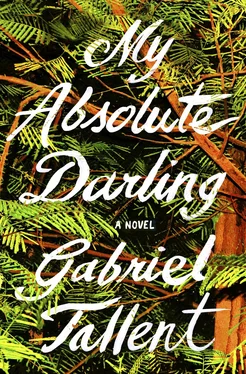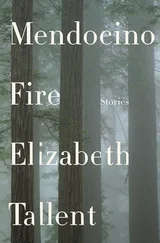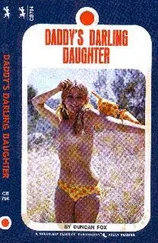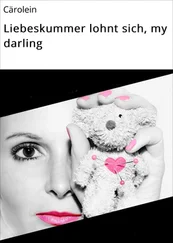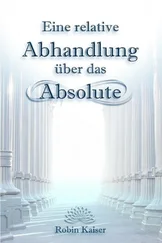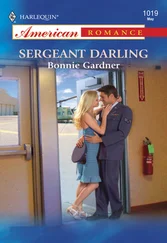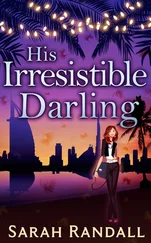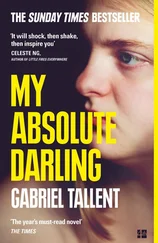She thinks, it is light enough now. I could make it back and it wouldn’t even be hard, except—what are you giving up on, if you do that? She thinks, you know exactly what you’re giving up on, and the question is, what are you willing to risk? When it comes down to it, she thinks, I am willing to risk a great deal. I am willing to risk these boys and it’s just for myself and it’s nothing to them, they don’t even know, and I won’t even tell them. She thinks, if they find out, they find out, and I will take that risk because I am a bitch.
Before long, Jacob crawls out and climbs with difficulty down the stump’s side. He sits beside her and looks at her feet, which are small, with painfully high arches. They look lathed almost, or worked, articulated tendons and bones without any softness. Her callus is contoured like a streambed and grained like a fingerprint. Jacob watches for a moment. She is glad to see him, and she is particularly glad to see him because of the risks she is taking to make it possible. He doesn’t know what he is involved in and it makes the moment of sitting on the log, beside him, important to her.
He says, “Well, that’s strangely attractive.” He nods to where she is digging into the callus with the knifepoint. His voice is guileless but full of humor, and she smiles despite herself. She does not know if he is making fun of her or if he is making fun of himself, and then, immediately after her smile, she understands.
She stiffens, stooped over her feet with knife in hand, tightening her jaw, acutely aware of her bitch face and ugly skin. Her whiteness is ugly and uneven, she knows, a freckled semitransparent whiteness so that her boobs, pathetically small and milkily untanned, are almost blue. She feels girded with imperfection and wants to play along with Jacob’s teasing, as if her repulsiveness is a prank she’s played on herself. She smiles her lopsided half smile, and smiling, wants to smash to pieces, because she has told herself not to play along when someone is cruel to her, but this boy has so unraveled her that she cannot stick to her intentions.
He has a way of watching her that makes her feel as if she is the most important thing in the world. She stoops there, thinking, slit, slit, slit, that unlovely slot lodged between her legs, unfinished by inattention or design, opening into her own peculiarity, its aperture and its sign, and she understands it now; the slit is illiterate — that word undresses her of all that she has knotted and buckled up about herself; she feels collapsed—every bitter, sluttish part of her collapsed and made identical to that horrible clam.
He says, “Where to next, Mowgli?”
“You want my help?” Still looking at him, willing to let it go, but unwilling to go without dignity. She is asking for something, and he gives her all of it in his expression alone, which is open and generous and sorry.
“Yes. Very much.”
“No poison oak rashes yet,” she observes.
“It’s gonna be bad,” he says.
“Yeah,” she says, “I can help.”
He says, “So, it’s none of my business—”
“Yes?”
“But I couldn’t help notice, just now, that you have a gun.”
“Yeah.”
“Why?” he says.
She leans and spits into the duff. “Because I can.”
“Well, that’s true,” he says, “but are you—do you think that you might need to shoot someone?”
“It’s a precaution,” she says.
“Is it, though?” he says. “Owning a gun, you are nine times more likely to be shot by a family member than by an intruder.”
She cracks a knuckle, unimpressed.
“I’m sorry,” he says, softening. “I’m not challenging you, or criticizing—not at all—I just want to hear your perspective. That’s all. I don’t really think that you’re gonna be shot by a family member.”
Before she can answer, Brett groans and stirs, then peeks his head out from under the tarp.
They break camp. Jacob unknots each line and holds the raveling ends over a lighter, turning the nylon between thumb and forefinger to form a bulb of black. They shake the tarp out, and then she and Brett fold it together until they have a long rectangle. Jacob rolls the bundles on his thighs. Turtle parcels them with half hitches and lashes them to the backpack. Then she stands in the stump and throws down their things to them, and they load all this into the backpacks.
They follow the north bank of the river, eating focaccia and hunks of cheese, following broad avenues among the trees where the trickling runoff sorts the rust-colored needles into ripples.
Soon they come to a winding paved road, the asphalt seamed with tar where the cracks have been patched. She thinks, the hell, I’m just delaying the moment, but the moment will come, and then we will see, and he will be fair with me, or he will be unfair, and if he is fair, then it will be hard. They reach a large engraved redwood burl that reads RIVENDELL SPRINGS AHEAD . They have seen no cars and no other people. The world is theirs alone.
Brett says, “I think my mom does massage therapy here.”
“You mean, she’s there right now?” Jacob says.
“Probably. Most days. If she got called in.”
“Would she give us a ride?”
“Sure.”
They follow the turnoff to a parking lot with sprays of fairy wands in large blue and gold clay pots and a high redwood gate. A dozen run-down cars. Brett opens a Ford Explorer with a key from the gas cap and they stash their bags. A dream catcher hangs from the rearview mirror, the center console is filled with oils, sunscreens, hand salves, beeswax lip balms. Unopened bills clutter the dash. Jacob pulls off his muddy T-shirt and balls it up and throws it into the passenger footwell before pulling on a clean Humboldt T-shirt.
Turtle says, “I’m gonna leave you here.” She looks back over the forest and she knows it’s time.
“But you can’t go,” Brett says.
“Why?”
“What if we open that gate,” Jacob says, “and they’re all zombies?”
“What?”
“If we’re forced to wander the postapocalyptic wastes of Northern California, we want you to be the reticent, shotgun-toting queen of our fellowship.”
“I think she’d have to have a chain saw for melee,” Brett says.
“For zombies,” Turtle says, “I’d like a .308, but if we really had to hoof it, you could talk me down to 5.56.”
“But seriously, what about a chain saw ?” Brett says.
“You’d throw your chain,” Turtle says.
“A samurai sword.”
“If you’re saying zombies,” Turtle says, “I’d take a tomahawk, sure. Use all the weight you’d spend on pistol ammo for more 5.56.”
“A shotgun,” Jacob says.
“Can’t carry enough ammo. For every shotshell you can carry, you could carry three or four rifle shells. Plus, shotguns reload slowly.”
Jacob says, “Couldn’t you get an auto shotgun with a magazine, like they have for rifles?”
“Sure,” Turtle says, “but rifle shells are metal-jacketed and do well in magazines. Shotshells deform under pressure and jam if stored in mags. Plus, auto shotguns are finicky. When you’ve got to shoot a lot, carry a lot, and scavenge for ammo, 5.56 is king.”
“See, we’ll never make it without you. Come on with us,” Jacob says. “Please?”
“Please?”
She’s grinning. “You’d make it.”
“Not without you we wouldn’t.”
“She’s coming,” Brett says, “look at her.”
“I’ll come.”
At the gate, they pull the bell cord and the three of them stand together, arguing about how to arm themselves for the coming apocalypse, Turtle barefoot, jeans rolled up to her knees and laden with drying mud. A shirtless man in hemp trousers opens the door, his chest tattooed with a Buddha over crashing waves, his hair in cigar-thick dreadlocks down to his waist.
Читать дальше
Конец ознакомительного отрывка
Купить книгу
